According to the Australian Institute of Health and Welfare, approximately 10% (roughly 460,000) of Australian children aged between zero and 14 were diagnosed with asthma as a long-term condition in 2017-18.
As a parent or carer, it’s important to be able to identify and understand asthma and its symptoms in children, so we’ve put together this guide to help you get informed.
UNDERSTANDING THE DIFFERENT FACTORS THAT CAN TRIGGER ASTHMA SYMPTOMS
People with asthma have airways that are more sensitive to some things that may not impact other people without asthma. The things that set off or start symptoms are called triggers. Every person with asthma has a different experience, and everyone may have a different trigger. It’s important for parents and carers to be aware of the asthma triggers in children to help prevent and manage attacks.
It’s imperative to understand asthma triggers a child may have to best identify and treat the resulting symptoms.
Some of the many Asthma triggers include:
Emotional triggers
For some children, emotions such as laughter, grief, crying, stress, anxiety, and depression may be common triggers for their asthma. These emotions may cause flare-ups and asthma attacks for people with asthma.
Deodorant, perfume, incense, and strong scents
Asthma symptoms can be triggered by spray deodorants and strong scents including incense and perfume.
Wood fires and unflued gas heating
For children with asthma, smoke and poor air quality can be a trigger that can irritate their airways and lead to symptoms or asthma flare-ups.
Animal triggers
Children with asthma have also been known to have allergies, some of which may include animals.
Exercise-induced triggers
Exercise-Induced Bronchoconstriction (EIB), is a temporary narrowing of the lower airways, occurring after vigorous exercise
Hay fever triggers
Hay Fever causes an immune response in the lining of the nose where the nasal passages become red, swollen, and sensitive.
Air quality triggers
Poor air quality has a significant impact on children living with asthma, and can worsen the symptoms of asthma.
Pollen triggers
Pollens from trees and grasses are a common trigger for children with asthma that can worsen or flare-up asthma and hay fever symptoms.
Extreme weather and bushfire smoke triggers
Australia is prone to extreme weather events such as bush fires, heatwaves, dust storms, thunderstorms, and flooding.
Cigarette smoke triggers
Cigarette smoke makes asthma symptoms worse and stops preventer medicines from working fully.
How do I identify severe asthma symptoms in a young child?
Small children are very susceptible to breathing difficulties, due to their small underdeveloped airways. If you are a parent or carer of a small child, particularly if they have a respiratory condition, you should be on high alert for signs of breathing difficulties. But how do you identify when they are in severe respiratory distress?
Breathing difficulties
Young children experiencing breathing difficulties will use all their chest muscles to breathe.
Skin Tugging
You may notice tugging of the skin at the base of the neck called the tracheal tug.
Chest Retractions
Ribs recession may occur where the skin around the ribs is sucked in with each breath.
Stomach Pumps
Tummy pumping whilst the child is trying to breathe.
Out of breath
Breathlessness trying to do normal activities – for example when playing.
Asthma fatigue
Lethargy and fatigue may be a telltale sign of the above asthma.
Short lasting asthma reliever medication
Reliever medication is not lasting as long
Immediately commence Asthma First Aid, if Asthma First Aid is not effective Dial Triple Zero (000). If a child has any of these symptoms, you should see a GP or go to the hospital as soon as possible, don’t delay.
Life-threatening symptoms of asthma:
- Gasping for breath
- Unable to speak or only 1-2 words at a time
- Becoming confused
- Turing blue
- May no longer have cough or wheeze
- Not responding to blue reliever
In the event of any of the above symptoms, dial Triple Zero (000) and commence Asthma First Aid immediately.
How to identify mild or worsening asthma symptoms in a child?
Mild asthma may be very hard to identify in children, as symptoms aren’t as apparent, but will still require attention.
Mild or worsening asthma symptoms you can look out for:
- A persistent cough or a wheeze
- Can talk in full sentences but may get breathless undertaking normal activities
- Showing signs of sleep disruption, waking up during the night or early in the morning with asthma symptoms
- Lethargy, stress, or fatigue due to the above.
If a child is experiencing mild to moderate asthma symptoms commence Asthma First Aid and follow your the child’s Asthma Action Plan. If you are unsure, seek medical attention, that same day with your child’s regular doctor or your local emergency department (hospital).


Asthma support for parents and carers
Asthma Assist is a free asthma information service that aims to support you and your family in better managing asthma.
Helping more than 32,000 people across Australia, this service offers upon sign up:
- An Asthma Toolkit including helpful brochures, Asthma Action Plans, educational videos, plus more!
- A subscription to our e-newsletter, jam-packed with updates on asthma management, latest research, and what Asthma Australia is doing to better support the one in nine Australians with asthma.
If you have any further questions regarding our Asthma Assist service, please contact our Asthma Educators on 1800 ASTHMA (1800 278 462) or email us at AsthmaSupport@asthma.org.au.
Asthma resources for schools
The Schools Health Check is designed to help schools review and evaluate their asthma management readiness.
The results will help support and enhance student, staff, and visitor asthma management daily and in the event of an asthma emergency.
The Check will provide targeted feedback, recommendations for consideration, and guide schools towards additional resources and tools as required.
Click here to do your school health check today.
For more information about understanding asthma in children, we’re here to assist.
Contact us or call 1800 278 462
Partners
echamber and Flo are campaign partners of Asthma Australia and have not been involved in the development of this web page/content.








